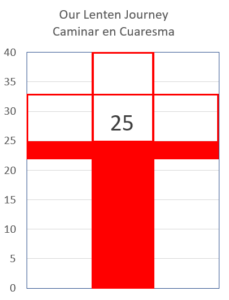

Our Lenten Journey / Caminar en Cuaresma
versión en español
Thursday – March 23 – Day 26
Human or Divine Praise?
“How can you believe, when you accept praise from one another and do not seek the praise that comes from the only God?” John 5:44
It’s quite normal and healthy for a parent to praise a young child for the good that they do. This healthy positive reinforcement is a way of teaching them the importance of doing good and avoiding what’s wrong. But human praise is not an infallible guide of what is right and wrong. In fact, when human praise is not based in the truth of God, it does great damage.
This short Scripture quote above comes from a lengthy teaching from Jesus about the difference between human praise and “the praise that comes only from God.” Jesus makes it clear that the only thing that has value is the praise that comes from God alone. In fact, earlier in this Gospel, Jesus says clearly, “I do not accept human praise…” Why is that?
Turning back to the example of a parent praising a child for the good they do, when the praise they offer is truly a praise of their goodness, then this is much more than human praise. It is praise from God given through a parent. A parent’s duty must be to teach right from wrong in accord with the will of God.
As for the “human praise” of which Jesus speaks, this is clearly praise of another that is void of the truthfulness of God. In other words, Jesus is saying that if someone were to praise Him for something that did not originate from the Father in Heaven, He would reject it. For example, if someone were to say of Jesus, “I think He would be a great governor of our nation because he could lead a revolt against the current leadership.” Obviously such “praise” would be rejected.
The bottom line is that we must praise one another, but our praise must only be that which originates from God. Our words must be spoken only in accord with the Truth. Our admiration must only be of that which is the presence of God alive in others. Otherwise, if we praise others based on worldly or self-centered values, we only encourage them in sin.
Reflect, today, upon the praise you give and receive. Do you allow misguided praise of others to misdirect you in life? And when you compliment and praise another, is that praise based on the Truth of God and directed to His glory? Seek to give and receive praise only when it is grounded in the Truth of God and directs all to His glory.
Let us pray:
My praiseworthy Lord, I do thank You and praise You for Your perfect goodness. I thank You for the way that You act in perfect union with the will of the Father. Help me to listen only to Your voice in this life and to reject all the misleading and confusing voices of the world. May my values and choices be guided by You and You alone.
Source: mycatholic.life
USCCB Daily Readings: bible.usccb.org/bible/readings/032323.cfm
Jueves – 23 de marzo – Día 26
¿Alabanza humana o divina?
“¿Cómo podéis creer, cuando aceptáis la alabanza unos de otros y no buscáis la alabanza que viene del único Dios?” Juan 5:44
Es bastante normal y saludable que un padre elogie a un niño pequeño por el bien que hace. Este saludable refuerzo positivo es una forma de enseñarles la importancia de hacer el bien y evitar el mal. Pero la alabanza humana no es una guía infalible de lo que está bien y lo que está mal. De hecho, cuando la alabanza humana no se basa en la verdad de Dios, hace un gran daño.
Esta breve cita bíblica de arriba proviene de una larga enseñanza de Jesús sobre la diferencia entre la alabanza humana y “la alabanza que viene solo de Dios”. Jesús deja claro que lo único que tiene valor es la alabanza que viene sólo de Dios. De hecho, anteriormente en este Evangelio, Jesús dice claramente: “No acepto la alabanza humana…” ¿Por qué?
Volviendo al ejemplo de un padre que alaba a un hijo por el bien que hace, cuando el elogio que ofrecen es verdaderamente un elogio de su bondad, entonces esto es mucho más que un elogio humano. Es la alabanza de Dios dada a través de un padre. El deber de un padre debe ser enseñar el bien del mal de acuerdo con la voluntad de Dios.
En cuanto a la “alabanza humana” de la que habla Jesús, se trata claramente de una alabanza de otro que carece de la veracidad de Dios. En otras palabras, Jesús está diciendo que si alguien lo alabara por algo que no se originó del Padre en el Cielo, Él lo rechazaría. Por ejemplo, si alguien dijera de Jesús: “Creo que sería un gran gobernador de nuestra nación porque podría encabezar una revuelta contra el liderazgo actual”. Obviamente tal “elogio” sería rechazado.
La conclusión es que debemos alabarnos unos a otros, pero nuestra alabanza debe ser solo la que se origina en Dios. Nuestras palabras deben ser pronunciadas sólo de acuerdo con la Verdad. Nuestra admiración debe ser sólo de lo que es la presencia de Dios viva en los demás. De lo contrario, si alabamos a los demás basándonos en valores mundanos o egocéntricos, solo los animamos a pecar.
Reflexiona hoy sobre las alabanzas que das y recibes. ¿Permite que los elogios equivocados de los demás le desvíen de la dirección en la vida? Y cuando felicitas y alabas a otro, ¿es esa alabanza basada en la Verdad de Dios y dirigida a Su gloria? Busque dar y recibir alabanza solo cuando esté basado en la Verdad de Dios y dirija todo a Su gloria.
Oremos:
Mi digno Señor, te agradezco y te alabo por tu perfecta bondad. Te agradezco la forma en que actúas en perfecta unión con la voluntad del Padre. Ayúdame a escuchar solo Tu voz en esta vida y a rechazar todas las voces engañosas y confusas del mundo. Que mis valores y elecciones sean guiados por Ti y solo por Ti.
Lecturas de Hoy: bible.usccb.org/es/bible/lecturas/032323.cfm